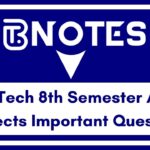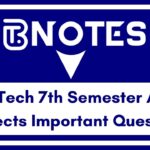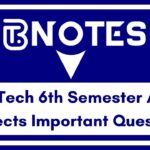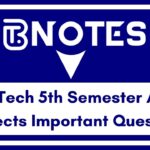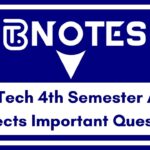The Bachelor of Technology (B.Tech) is a four-year undergraduate program that advances from foundational and core subjects to highly specialized and applied learning as students approach their final year. For Computer Science and Engineering (CSE) students, the 6th semester is a critical phase, emphasizing advanced topics, elective courses, and practical exposure through labs and projects.
This syllabus represents a typical 6th semester curriculum for CSE, focusing on areas like compiler design, cloud computing, and data science, alongside professional development skills. While specific subjects may vary by institution, this structure prepares students for industry roles, research, and their final-year projects by integrating theoretical depth with real-world applicability.
B Tech 6th Semester Syllabus
Duration: Approximately 5-6 months (including classes, labs, and exams).
Focus: Advanced specialization, elective exploration, and practical application.
Theory Subjects
1. Compiler Design
- Topics:
- Lexical Analysis: Tokens, Lexemes, Regular Expressions.
- Syntax Analysis: Context-Free Grammars, Parsing (Top-Down, Bottom-Up).
- Semantic Analysis: Syntax-Directed Translation, Type Checking.
- Code Generation and Optimization: Intermediate Code, Machine Code.
- Objective: Teaches the principles of designing and building compilers.
2. Cloud Computing
- Topics:
- Cloud Concepts: IaaS, PaaS, SaaS, Virtualization.
- Cloud Architecture: Public, Private, Hybrid Clouds.
- Technologies: AWS, Azure, Google Cloud Basics.
- Security and Scalability: Data Privacy, Load Balancing.
- Objective: Introduces distributed computing and cloud-based solutions.
3. Data Science Basics
- Topics:
- Data Preprocessing: Cleaning, Transformation, Normalization.
- Statistical Analysis: Mean, Median, Regression.
- Machine Learning: Clustering, Classification, Decision Trees.
- Tools: Python (Pandas, NumPy), R Basics.
- Objective: Provides an entry into data analysis and predictive modeling.
4. Elective – II (e.g., Machine Learning)
- Topics:
- Supervised Learning: Linear Regression, SVM, Neural Networks.
- Unsupervised Learning: K-Means, PCA.
- Evaluation Metrics: Accuracy, Precision, Recall.
- Frameworks: TensorFlow, Scikit-Learn Basics.
- Objective: Deepens knowledge in a chosen specialization (varies by choice).
5. Professional Ethics and Management Principles
- Topics:
- Ethics: Code of Conduct, Intellectual Property, Privacy.
- Management: Planning, Organization, Leadership.
- Project Management: Risk Analysis, Resource Allocation.
- Entrepreneurship: Basics of Startups, Innovation.
- Objective: Prepares students for professional and managerial roles.
Practical/Lab Subjects
| Lab | Experiments/Activities | Objective |
|---|---|---|
| Compiler Design Lab | Building lexical analyzers using tools like Lex.Parser implementation with Yacc.Code optimization simulations. | Hands-on experience in compiler construction. |
| Cloud Computing Lab | Setting up virtual machines on AWS/Azure.Deploying a simple application on the cloud.Load balancing and scalability experiments. | Practical skills in cloud infrastructure. |
| Data Science Lab | Data analysis with Python (e.g., Pandas).Implementing basic ML models (e.g., regression).Visualization using Matplotlib/Seaborn. | Reinforces data science techniques. |
| Mini Project/Industrial Training | Developing a real-world application (e.g., web app).Documentation and presentation of outcomes.Training report (if applicable). | Applies semester learnings to practical scenarios. |
Assessment
- Theory: End-semester exams (typically 60-70% weightage) + Internal assessments (assignments, quizzes, midterms; 30-40% weightage).
- Practicals: Lab performance, viva voce, and lab records.
- Credits: Each subject usually carries 3-4 credits (theory) or 1-2 credits (labs), totaling around 20-24 credits for the semester.
Notes
- Variations: Elective options might include “Cybersecurity,” “Internet of Things (IoT),” or “Big Data” instead of “Machine Learning.”
- Branch-Specific: This is for CSE; other branches might feature “Heat Transfer” (Mechanical) or “Control Systems” (Electrical).
Conclusion
The 6th semester of the B.Tech program in Computer Science and Engineering is a transformative phase, equipping students with advanced skills in compiler design, cloud computing, and data science, alongside elective specialization. The emphasis on practical labs and projects fosters a hands-on approach, bridging academic learning with industry needs.
This semester prepares students for their final year by enhancing their technical expertise and professional readiness, whether for internships, major projects, or careers in technology. Successfully completing this phase positions students to excel in cutting-edge fields and contribute meaningfully to the evolving world of computing.
More Resource:

